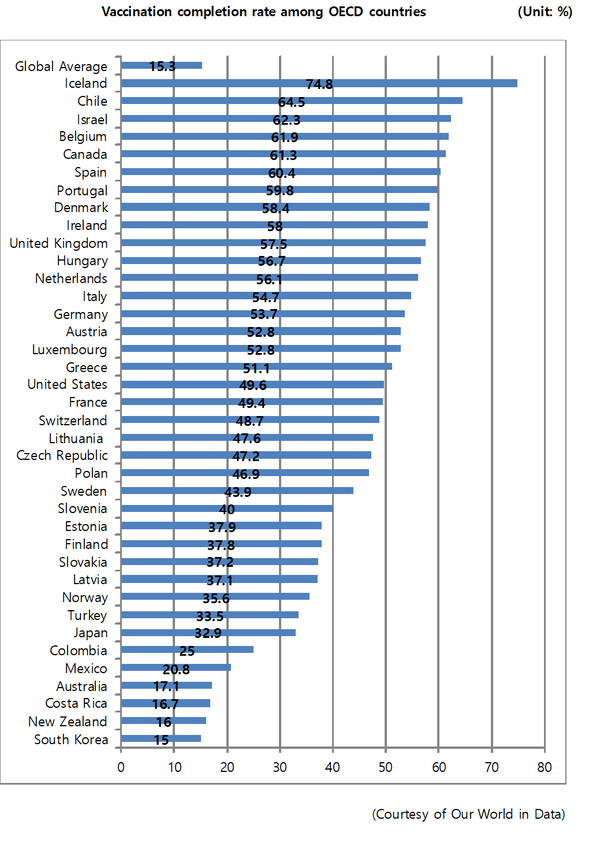Korea is the slowest nation among the Organization for Economic Cooperation and Development (OECD) members for completing Covid-19 vaccination for its citizens and may not achieve herd immunity as hoped in the second half, data showed.
According to Our World in Data, an international statistical site, Korea's vaccination completion rate was 15.06 percent, the lowest among 38 members of the OECD.
In Iceland, which ranked first, the complete vaccination rate as of Friday was 74.82 percent, about five times higher than that of Korea. New Zealand, which had previously ranked last among vaccination completion, has surpassed Korea after recording a vaccination completion rate of 15.96 percent last Tuesday.
The complete vaccination rate in Korea is even lower than the global average complete vaccination rate of 15.4 percent, making it the only OECD country below the global average. In addition, Korea is also showing a sluggish increase in the first dose of the vaccination as the current first jab vaccination rate is 40.7 percent, 34th among OECD countries.
According to experts, the sluggish vaccination rate in Korea is due to the government's failure to secure vaccines early.
In this regard, the government will explain vaccine imports and immunization plans in a news conference at 2:10 p.m. Monday. Minister of Health and Welfare Kwon Deok-cheol and Korea Disease Control and Prevention Agency Commissioner Jeong Eun-kyoung will hold the joint press conference.
Korea received attention as a model country for quarantine due to its rapid screening in the early stages of the outbreak of Covid-19. However, the government managed to kick off its vaccination program in earnest only in April, later than most OECD countries.
"The root cause is that the number of vaccines announced by the government did not arrive as planned," said Professor Kim Woo-joo of the Infectious Disease Department at Korea University Guro Hospital." Right now, the supply and demand situation for this year and next year is also uncertain."
Instead of having excessive expectations for homegrown vaccines or talking about the distant future, the government should use diplomacy to acquire more of Pfizer and Moderna's vaccines, he added.
The country, which aims to administer a single vaccination shot to 36 million people, or 70 percent of its population, by September with hopes of reaching herd immunity in November, has vaccinated 20.93 million people, or 40.8 percent of the 51.3 million people, with the first jab of the vaccine.
On Monday, the government started to receive reservations for vaccinations for people aged 18 to 49, estimated at some 16 million.
Korea's daily Covid-19 tally fell back to below 1,500 on Monday due to fewer weekend tests.
The Korea Disease Control and Prevention Agency (KDCA) confirmed 1,492 new virus cases, including 1,455 local infections, raising the cumulative caseload to 212,448. The figure is down 237 from 1,729 the previous day and is the first time that the nation recorded a figure below the 1,700s since last Wednesday. Four more people died of the coronavirus, increasing the death toll to 2,125 with a fatality rate of 1 percent.
To curb the spread of the virus, health authorities decided to extend the Level 4 distancing measures, the highest in the country's four-tier system, for the greater Seoul area until Aug. 22, with the rest of the country remaining under Level 3.
The toughest restrictions of Level 4 ban gatherings of more than two people after 6 p.m. and place a 10 p.m. curfew on restaurants and cafes and a ban on nightclubs and other entertainment venues.
Under Level 3, cafes and restaurants can accept customers until 10 p.m., and only takeout and delivery services are available after that time. Private gatherings of five or more people are banned.
However, the government expressed concerns over cases piling up outside of Seoul.
Notably, Busan, the country's second-largest city with many beaches, will raise its distancing rules to the toughest level from Tuesday until Aug. 22 as new infections have soared in the city in recent weeks.
"As the number and proportion of confirmed cases in non-capital areas continue to increase, the fourth viral wave is expanding nationwide," Minister Kwon said. "The number of seriously ill patients has more than doubled compared to before the fourth viral wave, and the burden on medical resources is increasing."
Acknowledging that small business owners and self-employed people are having a hard time making a living, Kwon stressed that in the current situation extending the distancing scheme is the best option to curb the spread of the virus.
"Now, it is more important than anything to stop the spread of Covid-19 by strictly following quarantine rules," he said. "Please cancel or postpone appointments and meetings, and spend the summer vacation in places where not many people gather."


